| Chief of the National Guard Bureau | |
|---|---|
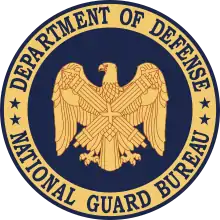 Seal of the National Guard Bureau | |
 Flag of the Chief | |
| National Guard Bureau | |
| Abbreviation | CNGB |
| Member of | Joint Chiefs of Staff |
| Reports to | Chairman of the Joint Chiefs of Staff |
| Nominator | President |
| Appointer | Senate |
| Term length | 4 years Renewable |
| Constituting instrument | 10 U.S.C. § 10502 |
| Formation | 14 February 1908 |
| First holder | COL Erasmus M. Weaver Jr. |
| Deputy | Vice Chief of the National Guard Bureau |
| Website | Official Website |
The chief of the National Guard Bureau (CNGB) is the highest-ranking officer of the National Guard and the head of the National Guard Bureau.[1] The position is a statutory office (10 U.S.C. § 10502), held by a federally recognized commissioned officer who has served at least 10 years of federally recognized active duty in the National Guard; the Army National Guard or the Air National Guard.[2] In a separate capacity as a member of the Joint Chiefs of Staff (10 U.S.C. § 151), the chief is a military adviser to the National Security Council, the Homeland Security Council, the secretary of defense, and the president on matters pertaining to the National Guard.[3]
The chief is nominated for appointment by the president from any eligible National Guard officers holding the rank of major general or above,[4] who also meets the requirements for the position as determined by defense secretary and the chairman of the Joint Chiefs of Staff,[4] under the advice and/or recommendation from their respective state governors and their service secretary. The chief and vice chief of the National Guard Bureau cannot be from the same service.[5] The nominee must be confirmed via majority vote from the Senate.[4] The chief serves a four-year term of office at the pleasure of the President.[4] By statute, the Chief is appointed as a four-star general[4] in the Army or Air Force, serving as a reserve officer on active duty.[4]
History
In 1908, the United States Army created the Militia Bureau to oversee training and readiness for the National Guard as part of implementing the Militia Act of 1903. From 1908 to 1911, Erasmus M. Weaver Jr. served as head of the Army's Militia Bureau, the first person to hold the position.[6] The National Defense Act of 1920 included a provision that the chief of the Militia Bureau must be a National Guard officer.[7][8][9] In 1921 Pennsylvania National Guard officer George C. Rickards became the first Guardsman to serve as Chief, and he held the post until his 1925 retirement.[10]
In September 1947, the Air National Guard was created, and the positions of Chief the Army Division and Chief of the Air Division were established, with the directors subordinate to the NGB Chief.[11] In 1953, Air National Guard Director Earl T. Ricks served as acting chief of the National Guard Bureau, making him the first Air Guard officer to hold the chief's position.[12] In the mid-1970s, the chief of the National Guard Bureau position was elevated from major general to lieutenant general, and La Vern E. Weber became the first NGB chief to wear three stars.[13]
The 2008 National Defense Authorization Act elevated the chief of the National Guard Bureau to the four-star rank of general making Craig McKinley the first National Guard officer to achieve four-star rank. In 2012, the position became the seventh member of the U.S. Joint Chiefs of Staff via the 2012 National Defense Authorization Act, which was signed into law by President Obama on 31 December 2011. The sitting Joint Chiefs at the time, had opposed the addition of another member, but the president promised in his 2008 campaign to elevate the office.[14]
Previous flag

This positional flag for the chief of the National Guard Bureau was used from 1998 to 2008. The dark blue represented the Army National Guard, the light blue represented the Air National Guard. The badge in the center is the branch insignia of the National Guard Bureau. The two triangles in the upper fly are "flight devices" and represent the Air National Guard.
The current version of the flag was adopted in 2008 when the position of Chief of the National Guard Bureau was upgraded to four-star general.
List of chiefs of the National Guard Bureau
.jpg.webp)
| No. | Commander | Term | Service branch | |||
|---|---|---|---|---|---|---|
| Portrait | Name | Took office | Left office | Term length | ||
| 1 | Colonel Erasmus M. Weaver Jr. (1854–1920) | 14 February 1908 | 14 March 1911 | 3 years, 28 days |  U.S. Army | |
| 2 | Brigadier General Robert K. Evans (1852–1926) | 15 March 1911 | 31 August 1912 | 1 year, 169 days |  U.S. Army | |
| 3 | Major General Albert L. Mills (1854–1916) | 1 September 1912 | 18 September 1916 | 4 years, 17 days |  U.S. Army | |
| - | Colonel George W. McIver (1858–1947) Acting | 18 September 1916 | 26 October 1916 | 38 days |  U.S. Army | |
| 4 | Major General William A. Mann (1854–1934) | 26 October 1916 | 26 November 1917 | 262 days |  U.S. Army | |
| 5 | Major General Jesse McI. Carter (1863–1930) | 26 November 1917 | 15 August 1918 | 262 days |  U.S. Army | |
| - | Brigadier General John W. Heavey (1867–1941) Acting | 15 August 1918 | 5 February 1919 | 174 days |  U.S. Army | |
| 5 | Major General Jesse McI. Carter (1863–1930) | 5 February 1919 | 28 June 1921 | 2 years, 143 days |  U.S. Army | |
| 6 | Major General George C. Rickards (1860–1933) | 29 June 1921 | 28 June 1925 | 3 years, 364 days |  U.S. Army | |
| 7 | Major General Creed C. Hammond (1874–1940) | 29 June 1925 | 28 June 1929 | 3 years, 364 days |  U.S. Army | |
| - | Colonel Ernest R. Redmond (1883–1966) Acting | 29 June 1929 | 30 September 1929 | 93 days |  U.S. Army | |
| 8 | Major General William G. Everson (1879–1954) | 1 October 1929 | 30 November 1931 | 2 years, 60 days |  U.S. Army | |
| 9 | Major General George E. Leach (1876–1955) | 1 December 1931 | 30 November 1935 | 3 years, 364 days |  U.S. Army | |
| - | Colonel Herold J. Weiler (1886–1945) Acting | 1 December 1935 | 16 January 1936 | 46 days |  U.S. Army | |
| - | Colonel John F. Williams (1887–1953) Acting | 17 January 1936 | 30 January 1936 | 13 days |  U.S. Army | |
| 10 | Major General Albert H. Blanding (1876–1970) | 31 January 1936 | 30 January 1940 | 4 years, 0 days |  U.S. Army | |
| 11 | Major General John F. Williams (1887–1953) | 31 January 1940 | 30 January 1944 | 4 years, 0 days |  U.S. Army | |
| - | Major General John F. Williams (1887–1953) Acting | 31 January 1944 | 31 January 1946 | 2 years, 0 days |  U.S. Army | |
| 12 | Major General Butler B. Miltonberger (1897–1977) | 1 February 1946 | 29 September 1947 | 1 year, 240 days |  U.S. Army | |
| 13 | Major General Kenneth F. Cramer (1894–1954) | 30 September 1947 | 4 September 1950 | 2 years, 339 days |  U.S. Army | |
| - | Major General Raymond H. Fleming (1889–1974) Acting | 5 September 1950 | 13 August 1951 | 342 days |  U.S. Army | |
| 14 | Major General Raymond H. Fleming (1889–1974) | 14 August 1951 | 15 February 1953 | 1 year, 185 days |  U.S. Army | |
| - | Major General Earl T. Ricks (1908–1954) Acting | 16 February 1953 | 21 June 1953 | 125 days |  U.S. Air Force | |
| 15 | Major General Edgar C. Erickson (1896–1989) | 22 June 1953 | 31 May 1959 | 5 years, 342 days |  U.S. Army | |
| - | Major General Winston P. Wilson (1911–1996) Acting | 1 June 1959 | 19 July 1959 | 48 days |  U.S. Air Force | |
| 16 | Major General Donald W. McGowan (1899–1967) | 20 July 1959 | 30 August 1963 | 4 years, 41 days |  U.S. Army | |
| 17 | Major General Winston P. Wilson (1911–1996) | 31 August 1963 | 31 August 1971 | 8 years, 0 days |  U.S. Air Force | |
| 18 | Major General Francis S. Greenlief (1921–1999) | 1 September 1971 | 23 June 1974 | 2 years, 295 days |  U.S. Army | |
| 19 | Lieutenant General La Vern E. Weber (1923–1999) | 16 August 1974 | 15 August 1982 | 7 years, 364 days |  U.S. Army | |
| 20 | Lieutenant General Emmett H. Walker Jr. (1924–2007) | 16 August 1982 | 15 August 1986 | 3 years, 364 days |  U.S. Army | |
| 21 | Lieutenant General Herbert R. Temple Jr. (born 1928) | 16 August 1986 | 31 January 1990 | 3 years, 168 days |  U.S. Army | |
| 22 | Lieutenant General John B. Conaway (born 1934) | 1 February 1990 | 1 December 1993 | 3 years, 303 days |  U.S. Air Force | |
| - | Major General Philip G. Killey (born 1941) Acting | 2 December 1993 | 1 January 1994 | 210 days |  U.S. Air Force | |
| - | Major General Raymond F. Rees (born 1944) Acting | 2 January 1994 | 31 July 1994 | 210 days |  U.S. Army | |
| - | Major General John R. D'Araujo Jr. (born 1943) Acting | 1 August 1994 | 30 September 1994 | 60 days |  U.S. Army | |
| 23 | Lieutenant General Edward D. Baca (1938–2020) | 1 October 1994 | 31 July 1998 | 3 years, 303 days |  U.S. Army | |
| 24 | Lieutenant General Russell C. Davis (born 1938) | 4 August 1998 | 3 August 2002 | 3 years, 364 days |  U.S. Air Force | |
| - | Major General Raymond F. Rees (born 1944) Acting | 4 August 2002 | 10 April 2003 | 249 days |  U.S. Army | |
| 25 | Lieutenant General H Steven Blum (born 1946) | 11 April 2003 | 17 November 2008 | 5 years, 220 days |  U.S. Army | |
| 26 | General Craig R. McKinley (born 1952) | 17 November 2008 | 6 September 2012 | 3 years, 294 days |  U.S. Air Force | |
| 27 | General Frank J. Grass (born 1951) | 7 September 2012 | 3 August 2016 | 3 years, 331 days |  U.S. Army | |
| 28 | General Joseph L. Lengyel (born 1959) | 3 August 2016 | 3 August 2020 | 4 years, 0 days |  U.S. Air Force | |
| 29 | General Daniel R. Hokanson (born 1963) | 3 August 2020 | Incumbent | 3 years, 147 days |  U.S. Army | |
See also
Notes
- ↑ "10 USC 10502 Chief of the National Guard Bureau: appointment; adviser on National Guard matters; grade; succession". Legal Information Institute. Retrieved 1 September 2017.
- ↑ U.S. Congress (28 January 2008). "Public Law 110-181: National Defense Authorization Act for Fiscal Year 2008". GPO.gov. Washington, DC: U.S. Government Publishing Office.
- ↑ United States Congress (2008). "SEC. 1812. Establishment of National Guard Bureau as Joint Activity of the Department of Defense". H.R. 4986 (110th): National Defense Authorization Act for Fiscal Year 2008. govtrack. Archived from the original on 18 March 2012. Retrieved 1 September 2017.
- 1 2 3 4 5 6 Public Law 110-181.
- ↑ "10 U.S. Code § 10505 - Vice Chief of the National Guard Bureau". LII / Legal Information Institute. Retrieved 23 December 2023.
- ↑ United States Infantry Association, Infantry Journal, Volume 5, 1908, page 292
- ↑ Dodd, Mead, Inc., The New International Year Book, 1934, page 575
- ↑ United States Field Artillery Association, The Field Artillery Journal, Volume 15, 1925, page 308
- ↑ Pittsburgh Press, "Maj. Smathers becomes First in Command", April 13, 1919
- ↑ Doubler, Michael Dale; Listman, John W. (2003). The National Guard: An Illustrated History of Americas Citizen-soldiers. Dulles, VA: Brassey's, Inc. p. 68. ISBN 978-1-57488-389-3.
- ↑ "New Commanding General of the Air Force Division". Flying. Chicago, IL: Ziff-Davis Publishing. 1 December 1948. p. 10.
- ↑ "Chief of the National Guard Bureau". The National Guardsman. Vol. 7. Washington, DC: National Guard Association of the United States. 1953. p. 8.
- ↑ Frazier, David L. "Biography, Weber, La Vern Erick". OKHistory.org. Oklahoma City, OK: Oklahoma Historical Society. Retrieved 10 December 2018.
- ↑ Thompson, Mark (4 January 2012). "The Changing of the Guard". Time. Retrieved 11 July 2017.
External links
![]() Media related to Chiefs of the National Guard Bureau at Wikimedia Commons
Media related to Chiefs of the National Guard Bureau at Wikimedia Commons

.jpg.webp)
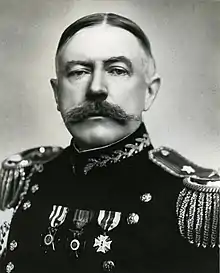
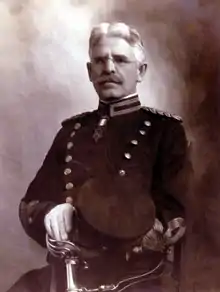

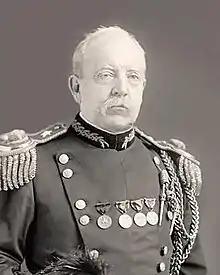
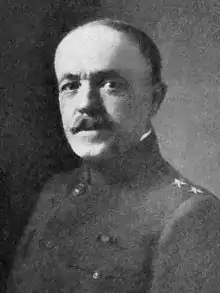

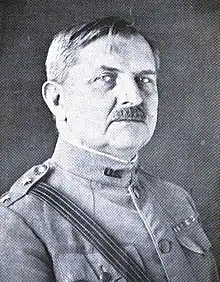
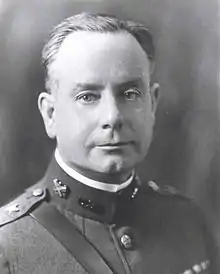
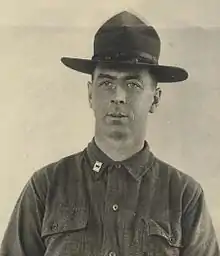
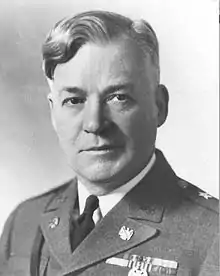
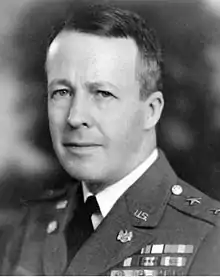
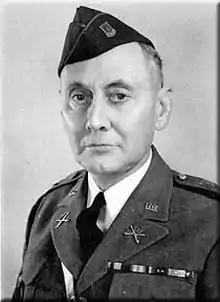
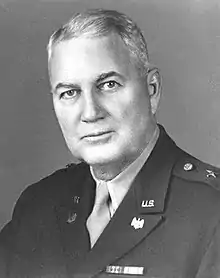
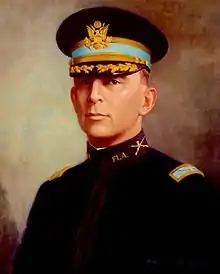
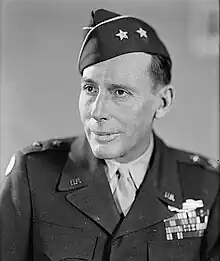
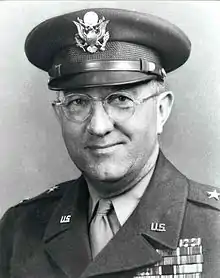
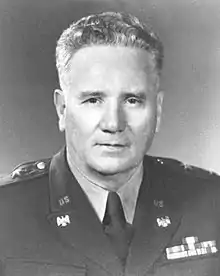
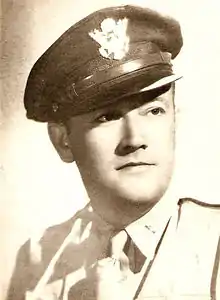
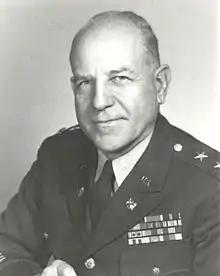
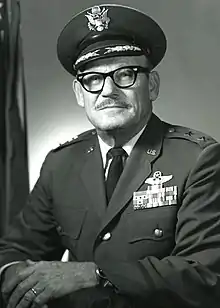

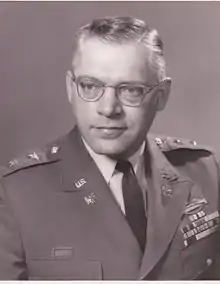
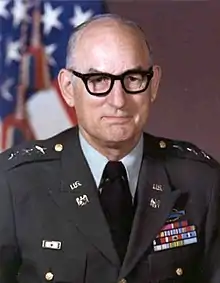
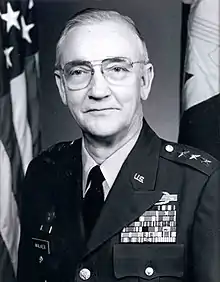
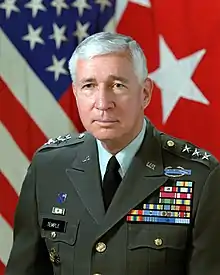

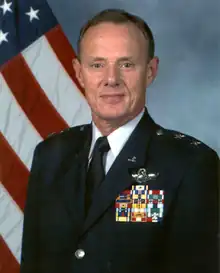
.jpg.webp)
.jpg.webp)
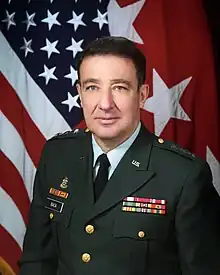
.jpg.webp)
_(U.S._Army_photo_by_Mr._Scott_Davis)_(Released)_(PC-193191).jpg.webp)
.jpg.webp)
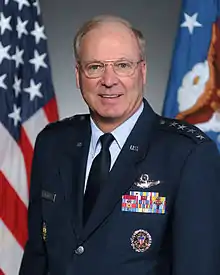
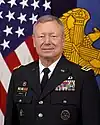
.jpg.webp)
.svg.png.webp)